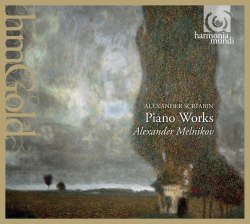|


|
Alexander SCRIABIN (1872-1915)
Prélude Op. 11 No. 4 [2:06]
Sonata No. 2, Op. 19 [10:37]
Two poems, Op. 32 [4:54]
Fantaisie, Op. 28 [9:28]
Feuillet d’album Op. 45 No. 1 [1:24]
Two Morceaux, Op. 57 [3:12]
Sonata No. 3, Op. 23 [15:42]
Five preludes, Op. 74 [6:02]
Irony Op. 56 No. 2 [2:07]
Sonata No. 9, “Messe noire”, Op. 68 [9:10]
Mazurka Op. 24 No. 3 [2:14]
Alexander Melnikov (piano)
rec. October 2005, Teldex Studio Berlin, Berlin
HARMONIA MUNDI HMG 501914 [68:10]
Alexander SCRIABIN (1872-1915)
Étude, Op. 8 No. 12 [2:21]
Sonata No. 2, Op. 19 [12:15]
Étude from Op. 2 [2:34]
Four mazurkas from Op. 3 [11:23]
Sonata No. 5, Op. 53 [11:04]
Nuances from Op. 56 [1:05]
Poeme from Op. 59 [1:31]
Sonata No. 9, “Messe noire”, Op. 68 [8:09]
Valse, Op. 38 [5:12]
Yevgeny Sudbin (piano)
rec. August 2006, Västerås Concert Hall, Västerås, Sweden
BIS BIS-SACD-1568 [57:23]
In 2006 and 2007, two young Russian-born pianists released Scriabin recital albums. Both discs covered Scriabin’s full composing career, across his early and late styles, and both included the Sonatas Nos. 2 and 9. For one pianist, the disc was his solo debut; for the other, it was his second album. Both wrote their own liner-notes, in writing styles that bordered on the hysterical. With the passage of time, we can see a few more things about those recordings: they are emblematic of the pianists’ contrasting personalities, and they are indispensable classics.
Alexander Melnikov’s 2006 recital is now being reissued, with a prettier cover design and a lower price point. Melnikov is the more poised, unruffled, almost withdrawn performer. His playing is soft, ethereal; his pauses can be as intense as the loudest chords. Hearing Melnikov’s Messe noire is a little bit like standing next to a bomb you know will explode, but the clock keeps ticking and the bomb keeps not exploding.
With Yevgeny Sudbin, the bomb is on a shorter fuse. His staccato notes are hair-raising, jutting out violently in contrast to Melnikov’s, and the climax is terrifying. In the second sonata’s fast movement, Sudbin is ruthless and machine-like in his efficiency - a performance that seems to gobble the notes up. However, Sudbin is not a total wild man, either. He’s a full minute slower in the second sonata’s andante, and that much more hypnotically in control of the music. His étude Op. 8 No. 12 is all the more powerful for being dynamically rather reserved. Inferior pianists play at a constant forte all the way through, substituting volume for drama.
Sudbin opts for more early music, including four glorious mazurka readings, presaging his great Chopin album. Melnikov turns to the end of Scriabin’s career, including the final five Preludes, Op. 74, unknowable black pearls that sound like they were written in outer space. Melnikov offers just one mazurka, an encore placed immediately after Messe noire, which in this context sounds as disturbed and forlorn as the work before it.
These two pianists have since gone on to two of the most distinguished careers of the young century. We can only hope they will continue living up to that promise. From Melnikov, we have heard a prize-winning cycle of Shostakovich Preludes and Fugues - half of which I have seen him play live - along with superb Shostakovich concerto recordings and chamber collaborations with Isabelle Faust, the Jerusalem Quartet and others. From Sudbin, we have heard concertos by Beethoven, Tchaikovsky and Medtner, along with a classic Chopin recital and a Ravel Gaspard de la Nuit which lived up to the menacing, hard-edged promise of his Scriabin.
Rivals? I think not. Sudbin and Melnikov are complementary, stylistically far enough apart that they need not fear each other. They reach greatness by being themselves. It’s no use, before you ask, drawing analogies to the last century, asking who will be Horowitz or Richter or Rubinstein. Sudbin and Melnikov will be themselves. If you do not know them, their Scriabin albums are illuminative starting points. If you do not know Scriabin, then these two albums will prove a spellbinding education.
Brian Reinhart
Previous review (Sudbin): Jens Laurson
 |
 |
|











